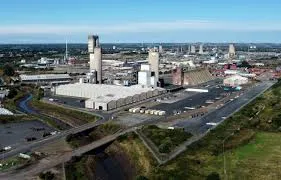
Aug . 21, 2024 06:35 Back to list
Premium Organic Nitrogen Fertilizers to Enhance Plant Growth and Health
The Importance of High-Quality Organic Nitrogen Fertilizers for Plants
Organic farming has gained significant traction in recent years, driven by a growing awareness of environmental sustainability and the health benefits of consuming organically grown produce. A vital aspect of organic farming is the use of high-quality organic nitrogen fertilizers, which play a crucial role in promoting healthy plant growth and improving soil fertility.
What Is Organic Nitrogen Fertilizer?
Organic nitrogen fertilizers are derived from natural sources such as plant materials, animal manure, and other organic matter. Unlike synthetic fertilizers, which can lead to soil degradation and water pollution, organic nitrogen fertilizers enhance the soil's health and microbiome. These fertilizers provide nitrogen - an essential nutrient that plants require for their growth, development, and overall yield.
The Role of Nitrogen in Plant Growth
Nitrogen is a key component of amino acids, the building blocks of proteins, which are vital for plant structure and function. It is also a significant part of chlorophyll, the compound that allows plants to photosynthesize, the process by which they convert sunlight into energy. Adequate nitrogen supply results in lush, green foliage and robust root systems. Conversely, nitrogen deficiency can lead to stunted growth, yellowing of leaves, and reduced crop yields.
Benefits of High-Quality Organic Nitrogen Fertilizers
High-quality organic nitrogen fertilizers offer numerous benefits over their synthetic counterparts
1. Improved Soil Health Organic fertilizers enhance the microbial activity in the soil, promoting a rich ecosystem that improves nutrient absorption capabilities. They contribute to the formation of humus, which enhances soil structure and moisture retention.
high quality organic nitrogen fertilizer for plants

2. Gradual Nutrient Release Unlike synthetic fertilizers that release nutrients rapidly, organic nitrogen fertilizers act slowly, providing a steadier supply of nitrogen over time. This gradual release minimizes the risk of nutrient leaching and ensures that plants have access to nitrogen throughout their growth cycle.
3. Environmental Sustainability Using organic nitrogen fertilizers reduces the risk of groundwater contamination and minimizes the carbon footprint associated with chemical fertilizers. This practice supports sustainable agriculture, promoting biodiversity and healthier ecosystems.
4. Enhanced Plant Resilience Plants nourished with organic fertilizers often exhibit improved resilience to pests and diseases. The natural substances found in organic fertilizers can boost plants' innate defenses, leading to healthier crops and reduced dependence on chemical pesticides.
Choosing the Right Organic Nitrogen Fertilizers
When selecting organic nitrogen fertilizers, several options are available, including fish emulsion, composted manure, blood meal, bone meal, and various plant-based fertilizers. Each type has its unique nutrient content and application rates, making it essential for farmers and gardeners to understand their specific needs and the nutrient requirements of their plants.
It’s also important to consider the source and quality of the organic fertilizer. Certified organic products ensure that the fertilizers are free from harmful chemicals and additives, promoting a truly organic approach to gardening and farming.
Conclusion
High-quality organic nitrogen fertilizers are essential for sustaining healthy plant growth and fostering a balanced ecosystem. By choosing organic fertilizers, growers can enhance soil fertility, promote environmental sustainability, and produce robust crops. As the demand for organic produce continues to rise, investing in organic nitrogen fertilizers will not only benefit individual growers but also contribute positively to the planet's health. Embracing organic practices paves the way for a sustainable future in agriculture, ensuring that we can meet our food needs while preserving the environment for generations to come.
-
10 10 10 Fertilizer Organic—Balanced NPK for All Plants
NewsJul.30,2025
-
Premium 10 10 10 Fertilizer Organic for Balanced Plant Growth
NewsJul.29,2025
-
Premium 10 10 10 Fertilizer Organic for Balanced Plant Growth
NewsJul.29,2025
-
Premium 10 10 10 Fertilizer Organic for Balanced Plant Growth
NewsJul.29,2025
-
50 Pound Bags of 13-13-13 Fertilizer for All Plants – Bulk & Organic Options
NewsJul.28,2025
-
High-Efficiency 15-30-15 Granular Fertilizer for Healthy Crops
NewsJul.28,2025
